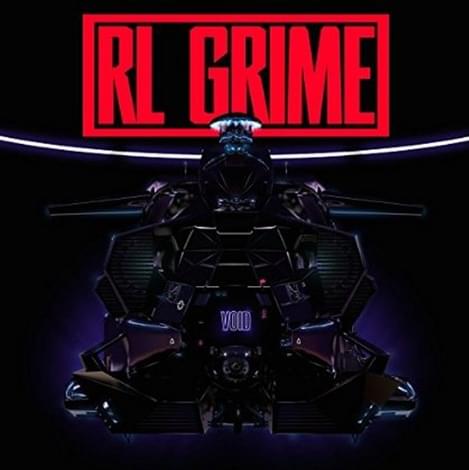RL Grime - Void
"Void"

Hip Hop occupies an equally important part of America’s collective psyche and has similarly become integrated into and has found a home on sticky dancefloors under the guise of ‘Trap’. Trap was born in the south, as the dirty south’s signature sound; answering to the G-funk of the West Coast and the dextrous, hard hitting east coast style, characterised by the use of 808 drum machines and its hummingbird hi hats. But trap remained something of a regional phenomenon until Lex Luger’s meteoric rise from obscurity in the late 2000s, laying down danceable tracks for Rick Ross, Waka Flocka Flame, and most importantly Jay Z and Kanye West on H.A.M., before lending his ear to Watch the Throne.
This short history lesson is important, because Trap is a diverse moniker. The trap of RL Grime, Bauuer, and Flostradamus has adopted elements of dubstep and its hick cousin brostep, born somewhere in the silence between sets in darkened clubs. It’s a maximalist format that regularly glues the gut-punch of dubstep and booming electro chords onto the 808 led hip hop format. The sometimes formulaic format result can be a parodic distortion of trap music much like brostep was for dubstep, and is very much an American phenomenon: whilst TNGHT’s “Higher Ground” was almost inescapable in 2012, it takes a more distorted, psychedelic approach than its American cousins, and it’s difficult to imagine Flosstradamus’ “Mosh Pit” ever breaking out in Berghain.
This new Trap’s association with brostep, and claims of cultural appropriation from some quarters makes it a dangerous world into which RL Grime, one of the foremost names associated with the scene, releases his debut Void. Steeped in futurism, it could be considered a cinematic concept album: each track feels like a grubby, ground level vision of the future; not the sleek white 2050 of apple adverts, but Blade Runner’s deep, dripping, night time noir. Indeed, the whole album seems centred around a theme plucked straight form Phillip K Dick’s fevered imagination; It’s the soundtrack to a neo-horror world in which Chief Keef and his gat toting, weed smoking, machine-gun-delivery soldiers run the streets. Violence bubbles just below the surface.
Opener “Always” is a sleek, 4am dub track; ambient noise and a sonar synth fades in, giving way to urgent hi hats as Grime grabs you by the libido and shows a subtle side to his production. The two lyrics “I feel better when I have you near me/Always” are pitched up, providing a sultry counterpoint to the throbbing bass beneath them. The album’s other sex scene is “Reminder”; featuring falsetto vocals from How To Dress Well, it’s a slinky, sexual neo-soul reminiscent of The Weeknd and both tracks display a subtlety and deftness of touch unseen to this point, belying his reputation as a big room bang merchant.
Not to say that this is an album of love songs; that pitched-up vocal sample returns on “Danger” which features Boys Noize. The single line ‘Danger’ rings out like a Prodigy branded air raid siren, and it’s an appropriate moniker for a violent, punchy track. Deep, raw synth, a 4/4 snare, and those chattering hi hats is all Grime needs to create a menacing soundscape, and he gives it an industrial techno flavour. This, combined with highlight and tribal house number “Site Zero / The Vault” further underlines his subtle touch and wide range.
All of which makes “Scylla” disappointing. Whilst it’s a well-executed track, and begins brightly with tightly wound snares, futuristic arpeggios and a skanking reggae backdrop all fade out and what should be a jump-up banger falls foul of the formulaic trap the genre’s accusers have laid out. A klaxon announces the drop as heavy midi horns and a whirr like a motorised camera shutter feel tacked-on and sit on the track like a wart on a beautiful 180 bpm face. And the same could be said for “Valhalla”; the two tracks are practically interchangeable, this time with a punishing jungle beat giving way to those lumbering horns.
Sandwitched between the two Grime gets it right. It’s pure trap; rattling, syncopated hi hats and deep kicks are both present, and another vocal sample stands out. This time a simple off-key yodel giving the track an eastern feel; Big Sean’s slick, hedonistic flow (“and I’m gonna get fucked up until they carry me outside/only way you gonn’ stop me is if you gonn’ shoot me down or bury me alive”) and a reverb heavy woodblock combine with the laid back slack rap chorus to conjure images of a derelict Neo-Tokyo opium den. Presumably Grime held back. He was forced to; focussing on a huge drop and working outwards from there would overpower Big Sean’s verses. Leaving the vocal with room to breathe results in a quieter, subtler approach over and above the easy one-two punch of build-up and drop and its cheap buzz, and the track is better for it.
This is true for both “Monsoon” and “Julia”, both of which feature drops to inspire stupid dancemoves on both sides of the Atlantic, but crucially neither seems centred around this phenomenon and they stand as uniform entities, well thought out and with less of the tacky showmanship.
Which is the case with final track “Golden State”; it’s apocalyptic, teetering around the edge of the abyss and constantly threatens to throw you in, and shows that Grime can make an expansive, monumental track without resorting to cheap tricks. It provides a suitably apocalyptic, futuristic close to an ambitious debut album which earmarks RL Grime as a talented producer with a range of sonic weaponry at his disposal. As Trap’s leading light however he fails to entirely silence the critics. Whilst he breaks out of the mould, as with several tracks, the album contains the occasional blemish.
Get the Best Fit take on the week in music direct to your inbox every Friday

Great Grandpa
Patience, Moonbeam

Deafheaven
Lonely People With Power

Perfume Genius
Glory





